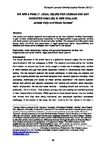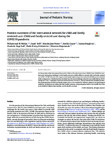Measuring family-centred care practices in adult ICUs: the EMPATHIC-F questionnaire

Date
2021-06-19Author
Subject
Metadata
Show full item recordAbstract
<jats:title>Abstract</jats:title><jats:sec><jats:title>Background</jats:title><jats:p>Engaging relatives in the care of critically ill patients is associated with better outcomes. It is crucial to empower relatives to provide feedback. Valid satisfaction instruments are essential to identify best practices and areas for improvement.</jats:p></jats:sec><jats:sec><jats:title>Aim</jats:title><jats:p>The aim of the study was to adapt the Spanish version of the EMpowerment of PArents in The Intensive Care‐30 (EMPATHIC‐30) questionnaire in adult intensive care units (ICUs) and psychometrically test the EMpowerment of PAtients in The Intensive Care‐Family (EMPATHIC‐F) questionnaire to measure family satisfaction.</jats:p></jats:sec><jats:sec><jats:title>Design</jats:title><jats:p>This is a cross‐sectional, prospective study conducted in two adult ICUs. Participants were relatives of patients who were discharged alive from the ICUs with an ICU length‐of‐stay >24 hours. The EMPATHIC‐F questionnaire is divided into five domains that are related to the family‐centred care principles. Responses are provided on a 6‐point ordinal Likert scale, a score of >5 is considered acceptable.</jats:p></jats:sec><jats:sec><jats:title>Results</jats:title><jats:p>Patients' relatives confirmed the adaptation of the instrument. A total of 262 relatives responded to the EMPATHIC‐F questionnaire (97% response rate). The empirical structure of the instrument was established by confirmatory factor analysis confirming 30 statements within five theoretically conceptualized domains: information, care and treatment, family participation, organization, and professional attitude. On item level, two statements scored a mean below 5.0. Cronbach's <jats:italic>α</jats:italic> at the domain level was between .64 and .75. Congruent validity was adequate between the five domains and four general satisfaction items (<jats:italic>r</jats:italic>'s .26‐.54). The non‐differential validity was confirmed with no significant effect size between three patients' demographic characteristics and the domains.</jats:p></jats:sec><jats:sec><jats:title>Conclusions</jats:title><jats:p>The EMPATHIC‐F questionnaire is a reliable and valid quality performance indicator to measure the perceptions of family members in adult ICU settings.</jats:p></jats:sec><jats:sec><jats:title>Relevance to clinical practice</jats:title><jats:p>The EMPATHIC‐F questionnaire can be used to benchmark and provides a framework for standardized quality improvement towards the development of a family‐centred care philosophy within adult ICUs.</jats:p></jats:sec>
Collections
Publisher
Place of Publication
Journal
Volume
Issue
Pagination
Recommended, similar items
The following license files are associated with this item:
Related items
Showing items related by title, author, creator and subject.
-
FAMILY SATISFACTION IN AIR FORCE FAMILIES AS A FUNCTION OF FAMILY STRENGTHS. RESOURCES AND COPING FOLLOWING RELOCATION
Olsen, Mary Glyer (University of Plymouth, 1988)The purpose of this study was to investigate to what extent the level of coping skills, internal resources, social support, perception and pile-up of life events affect Air Force families’ adjustments after relocation. ... -
We Are a Family: Legal Issues for Lesbian and Gay Parented Families In New Zealand
Kelly, Janette; Surtees, Nicola (University of Plymouth, 2013)This article summarises research commissioned by the New Zealand Families Commission to gain a better understanding and awareness of the legal position of gay parented families and donor parents compared to heteronormative ... -
Position statement of the international network for child and family centered care: Child and family centred care during the COVID19 pandemic
Al-Motlaq, M; Neill, Sarah; Foster, MJ; Coyne, I; Houghton, D; Angelhoff, C; Rising-Holmström, M; Majamanda, M (ElsevierUnited States, 2021-11-01)It is the position of the International Network for Child and Family Centered Care (INCFCC) that COVID19 restrictions pose tremendous challenges for the health care team in their efforts to provide child and family centered ...




